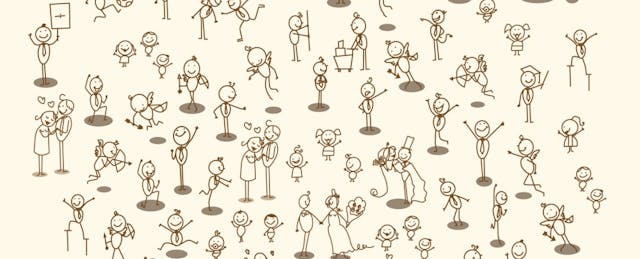“Intelligence plus character — that is the goal of true education,” Martin Luther King, Jr. wrote in the February 1947 edition of the Morehouse College student newspaper. More than half a century later, we’re still trying to figure out how to include character development in education.
Learning tools are everywhere—take your pick. Get employable career skills at General Assembly, Make School (where I work) and OneMonth. Get knowledge development at Khan Academy, Coursera and Udemy. Get social emotional intelligence at 7 Cups of Tea, Headspace and Calm.
Each tool gives you tracks: a roadmap of curricula, practice and feedback to help you grow.
You can build your career and mind. But what about your character? What about gaining skills in empathy, listening, love, discipline, forgiveness, asking for advice, community building and dialogue?
Programs including ToastMasters, Alcoholics Anonymous and Mankind project can build character. These incorporate in-person experience, practice and community. But character development here is more of a byproduct than a focus. What if character development was the head-on goal?
Character Flaws
Comprehensive character development training is not readily available; training that integrates the best research, practice, teaching methods, group experiences, community and outcomes.
This lack of guidance leads to what I call the character-development gap. If you want to build your career in a technical skill you have a (somewhat) linear path: enroll in classes. Read books by thought leaders. Intern. Find feedback from those who have succeeded before you. Get employed.
But, if you want to improve your character, you’ll get stuck at a “Five Ways to Be a Better Person” article or a therapist’s couch.
Hence the challenge: the same energy one uses to develop his or her career is not as effectively harnessed for character development.
So, we shrug off the notion that we can dramatically improve our character. We deem character as something that just comes naturally. You have it or you don’t. You hollowly say you’ll try to be a better person. And when you try, it’s a lonely waltz through readings, reflections, lamenting and conversations with friends. No tracks.
Yet character — our ability to love, listen, empathize, make and keep commitments — is what we live for. It brings us joy, good health, effectiveness in relationships. It’s the bedrock of our growth. And, ironically, our character drives our career too.
But without a faithful method to grow, its priority falls to the wayside. That could change.
Bridging the Character Development Gap
Dr. Fred Luskin is director of the Stanford Forgiveness Projects. His research demonstrates that learning to forgive leads to increased physical vitality, hope, optimism, and conflict resolution skills and decreased anger, blood pressure, depression and stress — no surprise! His second conclusion is even more exciting: Forgiveness is a skill that can be learned. He’s codified a process, runs workshops at Google and Fortune 500 companies and has gotten empirical results.
Turns out Luskin isn’t alone. Over the last seven years researchers and authors across the country have documented actions that adults can use to improve their character. This body of work is a great first step, but we are only halfway there. Their insights have yet to be turned into educational content or delivered to the mass market. They are stuck in books and research papers.
In an effort to bring character-development content to adult learners, I’ve started interviewing character-focused researchers and authors and recording those conversations in a podcast. Below are a few examples of springboard thought leaders I’ve interviewed whose work can help us build character development into education.
- Empathy — Author Roman Krznaric shares tactics of empathy development for individuals and organizations, how to break down barriers between people and stories on how empathy brought about some of the greatest innovations of the last century.
- Inclusion — Software developer Dom Deguzman teaches us how to build an inclusive organization and attitude, based on her work helping Bay Area startups address diversity issues.
- Willpower — New York Times journalist John Tierney shares seven strategies you can use to improve your willpower, common misconceptions about willpower, how tech can hold us accountable, and the secret to diets, exercise and more.
- Self-experimentation — A.J. Jacobs, bestselling author and human guinea pig, tells why self-experimentation can accelerate our personal growth.
- Mindfulness — Harvard researcher Sara Lazar shares with us how meditation changes the brain to promote more focus, more creativity, and decrease stress.
- Honesty — Psychotherapist and author Brad Blanton helps us go beyond “I told the truth” to a more difficult place: being honest with yourself, facing your fears and coming into the world with all your honest hopes and insecurities.
The K12 system has begun to formally address character development. KIPP Charter School Network partnered with the Dr. Martin Seligman and the late Dr. Chris Peterson—the“fathers” of positive psychology—to integrate character development into thousands of classrooms. KIPP co-founder Dave Levin provides lessons in a Coursera class, Teaching Character and Creating Positive Classrooms. Nonprofit startup Character Lab has created a Character Report Card to provide K12 students with regular feedback and goal setting.
We need more. I envision a world where character development is widely adapted for adult learners.
Imagine an online platform with a base of resources that drive offline communities around character traits—communities where people share their stories, feel less alone, plan personal-growth actions and hold each other accountable. Imagine if anyone who felt the urge to improve their character had the resources and support to do so.


